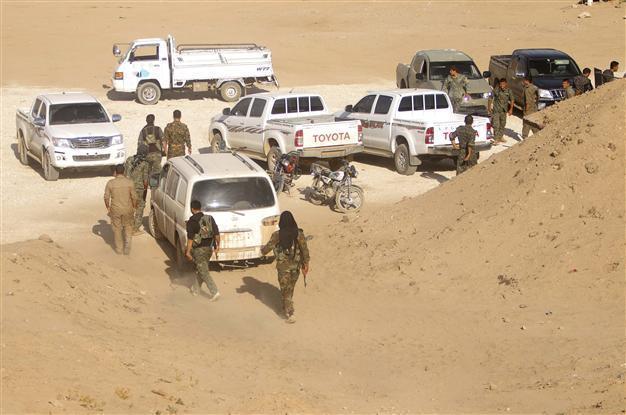Kurdish woman leading Kobane battle against ISIL: Monitor
BEIRUT - Agence France-Presse

Members of the Kurdish People's Protection Units (YPG) gather near their vehicles during what they said were clashes with ISIL fighters in the countryside of Ras al-Ain, Oct. 9. REUTERS Photo
A Kurdish woman fighter is leading the battle against militants of the Islamic State in Iraq and the Levant (ISIL) in the Syrian battleground town of Kobane, a monitoring group and activists said Oct. 12."Mayssa Abdo, known by the nom-de-guerre of Narin Afrin, is commanding the YPG in Kobane along with Mahmud Barkhodan," Syrian Observatory for Human Rights head Rami Abdel Rahman told AFP.
The Kurdish People's Protection Units (YPG) group has been defending Kobane, on the border with Turkey, since ISIL fighters launched an assault on September 16.
The group, the de facto army of the Kurdish regions of north and northeast Syria, is the armed wing of the powerful Kurdish Democratic Union Party (PYD).
As is the custom for Kurdish fighters, Mayssa, 40, uses a pseudonym, with hers coming from the Afrin region where she was born that is located like Kobane in Aleppo province.
"Those who know her say she is cultivated, intelligent and phlegmatic," said Mustefa Ebdi, a Kurdish activist from Kobane. "She cares for the mental state of the fighters and takes interest in their problems," he said.
Women traditionally form a major part of Kurdish fighting forces, and they are well represented among Kurdish forces in neighbouring Turkey and Iraq.
On October 5, young Kurdish woman fighter Dilar Gencxemis, identified by the YPG by the nom-de-guerre of Arin Mirkan, blew herself up outside Kobane in an attack which reportedly killed dozens of IS militants.
She became the first Kurdish woman suicide bomber since the 2011 start of Syria's conflict. Since the withdrawal of government forces from Kurdish areas of Syria in mid-2012, the PYD has set up local councils for Kurds to run their own affairs, with women filling 40 percent of seats.
















